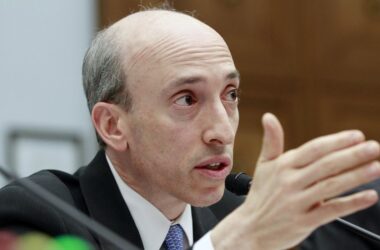The civil liberties board on Thursday urged Congress to renew the government’s top snooping tool, which scoops up communications from thousands of targets, saying that even with all of its flaws, the program has sniffed out serious terrorist threats to the U.S.
All five members of the Privacy and Civil Liberties Oversight Board agreed on the value of what’s known as the Section 702 program but said there are serious questions about its reach into Americans’ lives.
Their most important recommendation was to require the FBI and other agencies to get a court’s approval before checking an American’s name against the database.
But two members of the board were so troubled that they refused to sign on to the final report, saying Section 702 of the Foreign Intelligence Surveillance Act must be revamped to prevent weaponization against Americans.
At the same time, they said the government should use the tool more against foreigners, particularly those seeking to enter the U.S. as immigrants or visitors.
The report comes as Congress is rushing an end-of-year deadline. Unless Section 702 is renewed, the authority to run the government’s most important snooping tool will lapse.
All five members of the civil liberties board said they believe the country is safer with Section 702, but also agreed it needs changes to protect Americans from being snared.
“The Section 702 program plays a critical role in protecting our security, but it also presents significant threats to our privacy and civil liberties,” said Sharon Bradford Franklin, chairwoman of the civil liberties board.
Under Section 702, the intelligence community gathers emails and other communications and stores them for use. The targets are supposed to be “non-U.S. persons located abroad” — meaning no American citizens or foreigners living inside the U.S. are supposed to have their communications scooped up.
In 2022, nearly 250,000 targets had their communications collected, or twice the rate of five years earlier.
Still, since U.S. citizens may be talking with those foreign targets, Americans can have their communications collected. Several agencies, including the FBI, can query the data for investigations, though they have to follow rules when writing the queries so they don’t intrude too deeply into Americans’ communications.
Those guidelines have, however, repeatedly been breached, angering lawmakers on Capitol Hill who have questioned whether the program is worth the intrusions into Americans’ lives.
There is some doubt whether Congress can muster the votes to continue the program past its expiration at the end of this year.
The Civil Liberties Board said the biggest danger in the Section 702 program lies with the ability to query the data using the name of an American. Since the FBI is one of the agencies allowed access to the program, that means domestic law enforcement can use the data to investigate Americans — or worse, use it at the pre-assessment stage of an investigation.
That means Americans can be snooped without “any basis to suspect an individual of wrongdoing,” the board said.
The board also fretted over batch-job queries, where several terms are stacked together to get results.
Board members complained that the government doesn’t do a good enough job of collecting data about its activities. The National Security Agency says it cannot guess how much American data is collected in the program.
Beth A. Williams and Richard E. DiZinno, the two Republicans on the board, said they couldn’t sign off on this year’s report because they felt the changes the board is recommending will make the program worse for civil liberties.
“The entire board agrees that the Section 702 program is highly valuable and should be reauthorized. But the majority’s recommendations would increase the privacy and civil liberties risks to U.S. persons while rendering the program significantly less effective at protecting America’s critical infrastructure, countering foreign espionage and thwarting terrorist attacks on U.S. soil,” they wrote in an annex to the report.
They pointed to the FBI’s abuse of its snooping powers during the 2016 presidential campaign when the bureau falsified information in order to surveil a member of the Trump campaign and targeted a key national security adviser.
Mr. DiZinno and Ms. Williams said the government needs new rules before it can unmask a U.S. person. Unmasking is when a name is attached to a specific communication, tearing down the veil of anonymity that is supposed to protect Americans from some of the potential abuses of having their communications monitored.
“Moments of public doubt, like this one, offer the opportunity to redouble efforts to restore trust in our public institutions and accountability in our public servants,” they wrote.
The two experts also said the government could use the data it has to stop bad actors from abusing the U.S. immigration system. They said the law should allow for someone applying for a visa to be run against the data to see whether there are any secret flags.
“In our view, it is unacceptable that such information is lawfully collected, but rendered essentially unusable or severely limited. Vetting is a crucial national security function, and Congress should make clear that Section 702 may be utilized to support it,” the two wrote.
They declined to appear with their three Democratic colleagues at a public event to tout the report, saying they didn’t want to “legitimize” the “deeply flawed” conclusions.
The divisions in this year’s report stand in contrast to the board’s 2014 report, which was unanimous and helped shape Congress’ effort to reauthorize Section 702.
Ms. Franklin issued her own statement, saying that while she backed the report, she felt it should have gone further to protect Americans from searches of the data. She said searching the data for an American implicates the Fourth Amendment, and under that standard, the government should have to get court approval.







